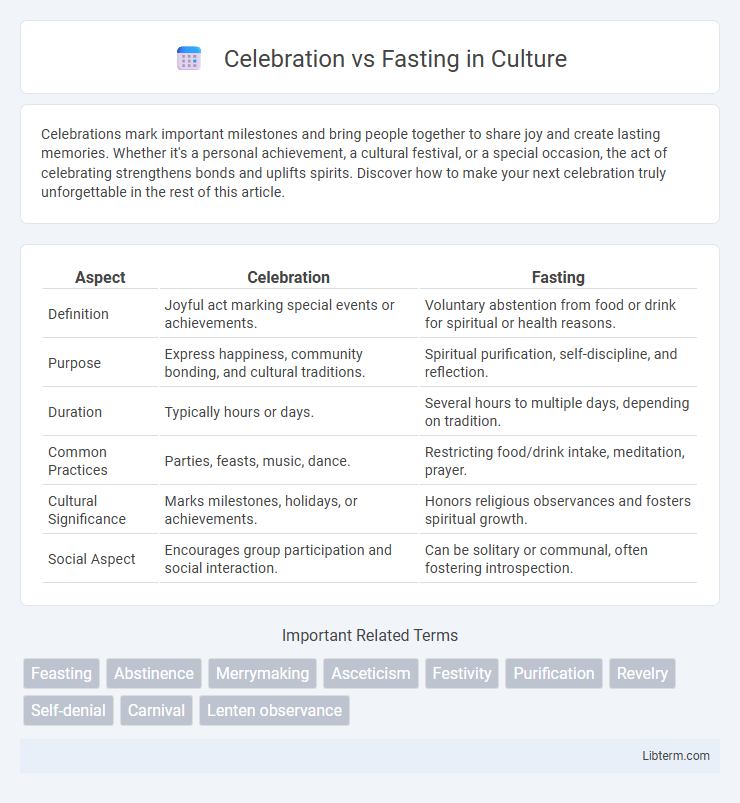Celebrations mark important milestones and bring people together to share joy and create lasting memories. Whether it's a personal achievement, a cultural festival, or a special occasion, the act of celebrating strengthens bonds and uplifts spirits. Discover how to make your next celebration truly unforgettable in the rest of this article.
Table of Comparison
| Aspect | Celebration | Fasting |
|---|---|---|
| Definition | Joyful act marking special events or achievements. | Voluntary abstention from food or drink for spiritual or health reasons. |
| Purpose | Express happiness, community bonding, and cultural traditions. | Spiritual purification, self-discipline, and reflection. |
| Duration | Typically hours or days. | Several hours to multiple days, depending on tradition. |
| Common Practices | Parties, feasts, music, dance. | Restricting food/drink intake, meditation, prayer. |
| Cultural Significance | Marks milestones, holidays, or achievements. | Honors religious observances and fosters spiritual growth. |
| Social Aspect | Encourages group participation and social interaction. | Can be solitary or communal, often fostering introspection. |
Introduction: Understanding Celebration and Fasting
Celebration involves engaging in joyful activities and rituals to mark significant events, often characterized by social gatherings, feasting, and expressions of happiness. Fasting refers to the voluntary abstention from food, drink, or certain pleasures for a specified period, commonly practiced for spiritual, religious, or health reasons. Both practices hold deep cultural and psychological significance, shaping individual and communal experiences.
Historical Roots of Celebration and Fasting
Celebration and fasting have deep historical roots tied to religious and cultural traditions worldwide. Celebrations historically mark significant events such as harvests, victories, and religious festivals, serving to strengthen community bonds through shared joy and rituals. Fasting, on the other hand, originates from spiritual disciplines found in ancient religions like Hinduism, Judaism, Christianity, and Islam, often symbolizing purification, penance, and heightened spiritual awareness.
Cultural Significance of Both Practices
Celebration and fasting hold profound cultural significance across various societies, symbolizing communal identity and spiritual values. Festivals and feasts often mark important historical events, religious milestones, and seasonal changes, reinforcing social bonds and shared heritage. In contrast, fasting serves as a ritual of purification, self-discipline, and reflection, fostering spiritual growth and a deeper connection to cultural traditions.
Psychological Effects: Joy vs. Reflection
Celebration triggers the release of dopamine and endorphins, fostering feelings of joy, social connection, and increased motivation. Fasting, by contrast, promotes mindfulness and introspection, often leading to enhanced emotional regulation and decreased stress through physiological changes like ketone production. Both practices influence mental health by balancing positive emotions with reflective awareness, supporting psychological well-being.
Health Impacts: Feasting and Fasting Compared
Feasting often leads to excess calorie intake, increasing the risk of obesity, insulin resistance, and cardiovascular diseases, while fasting promotes metabolic health by improving insulin sensitivity, reducing inflammation, and facilitating cellular repair processes. Intermittent fasting, a popular approach, has been shown to enhance brain function, support weight loss, and lower markers of chronic disease. Balancing periods of celebration with mindful fasting can optimize overall health and longevity.
Spiritual Perspectives: Elevation through Both
Celebration and fasting both serve as powerful spiritual practices that elevate the soul by fostering connection with the divine and enhancing self-awareness. Celebration brings joy and gratitude, creating a positive energy that uplifts the spirit and strengthens communal bonds in religious traditions. Fasting cultivates discipline and introspection, allowing believers to purify the mind and body, deepen their faith, and achieve spiritual clarity.
Social Dynamics: Gathering or Withdrawing
Celebrations foster social bonding by bringing people together through shared rituals, music, food, and communal activities that strengthen community ties and cultural identity. In contrast, fasting often involves withdrawing from social gatherings to focus on introspection, spiritual growth, and self-discipline, which can temporarily limit social interaction. Both practices shape social dynamics by either enhancing collective engagement or encouraging individual reflection within societal contexts.
Modern Trends: Balancing Excess and Abstinence
Modern trends in celebration increasingly emphasize mindful indulgence, balancing traditional excess with health-conscious choices and sustainability. Fasting practices have evolved beyond religious contexts into popular wellness routines like intermittent fasting, promoting metabolic health and mental clarity. The juxtaposition of celebration and fasting reflects society's shift towards harmonizing pleasure and self-discipline in lifestyle habits.
Celebration and Fasting across Religions
Celebration and fasting serve as pivotal religious practices across diverse faiths, symbolizing both joy and spiritual discipline. In Christianity, celebrations such as Christmas and Easter commemorate the life of Jesus Christ, while fasting during Lent fosters repentance and self-control. Similarly, in Islam, festive observances like Eid al-Fitr mark the end of Ramadan, a month dedicated to fasting that cultivates empathy and purification.
Choosing What Fits: Personalizing the Practice
Choosing between celebration and fasting depends on personal goals, cultural context, and spiritual needs, with each practice offering unique benefits for mental and physical well-being. Celebration can enhance social bonds and elevate mood through communal activities and symbolic rituals, while fasting promotes detoxification, discipline, and heightened focus by limiting food intake for specific periods. Personalizing the practice involves assessing individual health conditions, lifestyle, and spiritual aspirations to determine the most meaningful and effective approach.
Celebration Infographic

 libterm.com
libterm.com